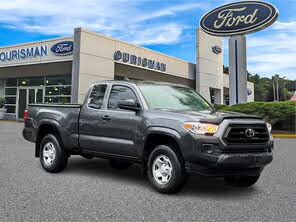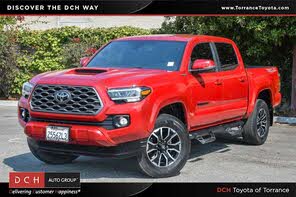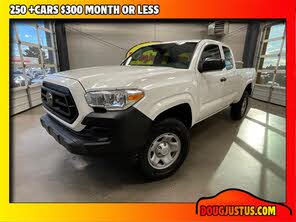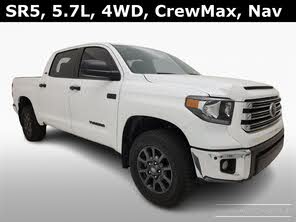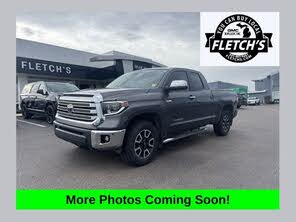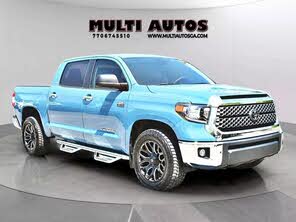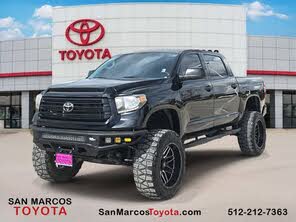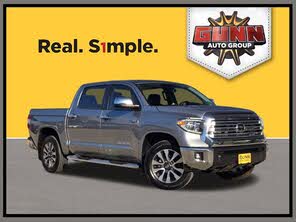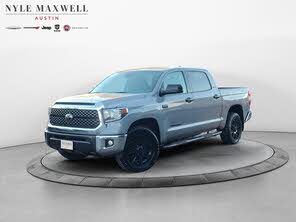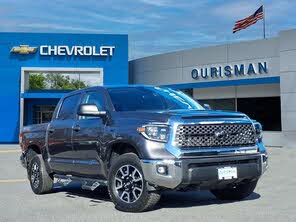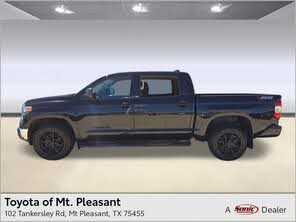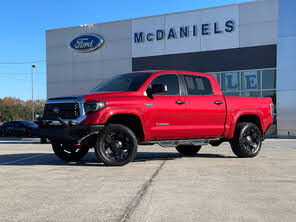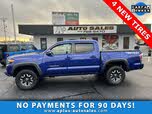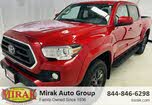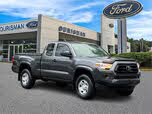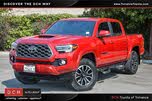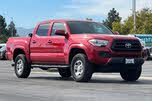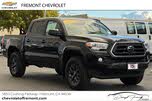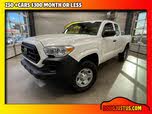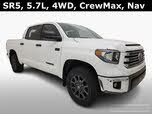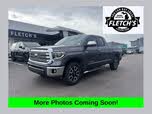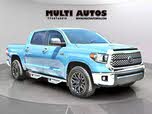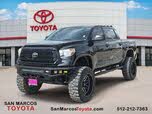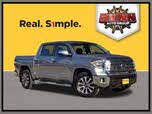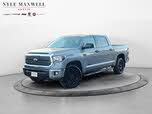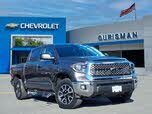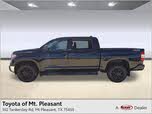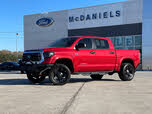2022 Toyota Tacoma vs 2021 Toyota Tundra
Overview | |
MSRP$34,125 | MSRP$27,150 |
Listings583 | Listings2397 |
Ratings & Reviews | |
User Reviews | User Reviews |
Expert reviews7.3 out of 10 | Expert reviews7.5 out of 10 |
Pros
Cons
| Pros
Cons
|
2021 Toyota Tundra Reviews SummaryIf you’ve been paying attention to any new truck ads, you’ll likely see items being promoted like a massive touchscreen or even a six-way multi-function tailgate. Like the rest of the automotive industry, the truck segment is charging ahead with many new innovations, incorporating new in-car technologies. But this seems like overkill for a segment whose main purpose is to tow, haul, and get work done. The window sticker for this Toyota Tundra says “2021,” but its design and underpinnings date back to the mid-2000s. It’s the oldest truck in a segment where companies are constantly one-upping and updating. So does the Tundra’s age hinder it among full-size pickups? Not really. In fact, it might be its best attribute. The Tundra might be an old design, but the engineers at Toyota have kept the Tundra relevant with some key updates and special editions. | |
2022 Toyota Tacoma Reviews SummaryOther small trucks have come and gone—and come back again—but the Toyota Tacoma has been the cornerstone of the segment for decades now. Though it has grown in size through the years, it has remained one of the best options if you’re in the market for a smaller alternative to full-size pickups. It’s a great option for a commuter who goes on the occasional camping, kayaking, or mountain biking adventure. The bed is good for picking up supplies to tackle a weekend project. But the midsize Tacoma has increased competition. In the past decade, the Chevrolet Colorado, GMC Canyon, and Ford Ranger have returned. The Nissan Frontier recently received a long-overdue overhaul. And there’s even a new crop of compact pickups, including the Hyundai Santa Cruz and Ford Maverick. So is the Tacoma still the big dog among small trucks? | |
Popular Features & Specs | |
Engine5.7L 381 hp V8 | Engine2.7L 159 hp I4 |
Drive Train4X2 | Drive Train4X2 |
Seating Capacity6 | Seating Capacity4 |
Horsepower381 hp @ 5600 rpm | Horsepower159 hp @ 5200 rpm |
MPG City13 | MPG City20 |
MPG Highway17 | MPG Highway23 |
Engine | |
Engine Name5.7L 381 hp V8 | Engine Name2.7L 159 hp I4 |
Torque401 lb-ft @ 3600 rpm | Torque180 lb-ft @ 3800 rpm |
Horsepower381 hp @ 5600 rpm | Horsepower159 hp @ 5200 rpm |
Drivetrain4X2 | Drivetrain4X2 |
Fuel Economy | |
MPG City13 | MPG City20 |
MPG Highway17 | MPG Highway23 |
Interior | |
Seating Capacity6 | Seating Capacity4 |
Safety | |
Front Crash Overall4 | Front Crash Overall4 |
Side Crash Overall5 | Side Crash Overall5 |
Dimensions & Capacity | |
Bed Length78.7 in | Bed Length73.7 in |
Curb Weight5170 lbs | Curb Weight3915 lbs |
Height76.0 in | Height70.6 in |
Length228.9 in | Length212.3 in |
Width79.9 in | Width74.4 in |
Wheelbase145.7 in | Wheelbase127.4 in |
Maximum Payload1730 lbs | Maximum Payload1685 lbs |
Number of doors4 | Number of doors4 |
Maximum Towing Capacity10200 lbs | Maximum Towing Capacity3500 lbs |
Standard Towing Capacity10200 lbs | Standard Towing Capacity |
Overview | ||
MSRP | $34,125 | $27,150 |
Listings | ||
Ratings & Reviews | ||
User reviews | ||
Expert reviews | 7.3 out of 10Read full review | 7.5 out of 10Read full review |
Pros & cons | Pros
Cons
| Pros
Cons
|
Summary | If you’ve been paying attention to any new truck ads, you’ll likely see items being promoted like a massive touchscreen or even a six-way multi-function tailgate. Like the rest of the automotive industry, the truck segment is charging ahead with many new innovations, incorporating new in-car technologies. But this seems like overkill for a segment whose main purpose is to tow, haul, and get work done. The window sticker for this Toyota Tundra says “2021,” but its design and underpinnings date back to the mid-2000s. It’s the oldest truck in a segment where companies are constantly one-upping and updating. So does the Tundra’s age hinder it among full-size pickups? Not really. In fact, it might be its best attribute. The Tundra might be an old design, but the engineers at Toyota have kept the Tundra relevant with some key updates and special editions. | Other small trucks have come and gone—and come back again—but the Toyota Tacoma has been the cornerstone of the segment for decades now. Though it has grown in size through the years, it has remained one of the best options if you’re in the market for a smaller alternative to full-size pickups. It’s a great option for a commuter who goes on the occasional camping, kayaking, or mountain biking adventure. The bed is good for picking up supplies to tackle a weekend project. But the midsize Tacoma has increased competition. In the past decade, the Chevrolet Colorado, GMC Canyon, and Ford Ranger have returned. The Nissan Frontier recently received a long-overdue overhaul. And there’s even a new crop of compact pickups, including the Hyundai Santa Cruz and Ford Maverick. So is the Tacoma still the big dog among small trucks? |
Video | ||
Popular Features & Specs | ||
Engine | 5.7L 381 hp V8 | 2.7L 159 hp I4 |
Drive Train | 4X2 | 4X2 |
Seating Capacity | 6 | 4 |
Horsepower | 381 hp @ 5600 rpm | 159 hp @ 5200 rpm |
MPG City | 13 | 20 |
MPG Highway | 17 | 23 |
Engine | ||
Engine Name | 5.7L 381 hp V8 | 2.7L 159 hp I4 |
Torque | 401 lb-ft @ 3600 rpm | 180 lb-ft @ 3800 rpm |
Horsepower | 381 hp @ 5600 rpm | 159 hp @ 5200 rpm |
Drivetrain | 4X2 | 4X2 |
Fuel Economy | ||
MPG City | 13 | 20 |
MPG Highway | 17 | 23 |
Interior | ||
Seating Capacity | 6 | 4 |
Safety | ||
Front Crash Overall | 4 | 4 |
Side Crash Overall | 5 | 5 |
Dimensions & Capacity | ||
Bed Length | 78.7 in | 73.7 in |
Curb Weight | 5170 lbs | 3915 lbs |
Height | 76.0 in | 70.6 in |
Length | 228.9 in | 212.3 in |
Width | 79.9 in | 74.4 in |
Wheelbase | 145.7 in | 127.4 in |
Maximum Payload | 1730 lbs | 1685 lbs |
Number of doors | 4 | 4 |
Maximum Towing Capacity | 10200 lbs | 3500 lbs |
Standard Towing Capacity | 10200 lbs | |
In 2021, the Toyota Tundra had a somewhat awkward appearance compared to its newer competitors. Originally conceived in the mid-2000s and launched for the 2007 model year, it represented a time when trucks were beginning to embrace the sizable design language that is now prevalent. The Tundra boasted a huge grille, but its small headlights seemed disproportionately tiny, giving it a strangely oversized look. The test vehicle for the Tundra came in a "Cement" paint color. Alongside blacked-out wheels and badging, this outdated truck managed to maintain a modern facade.
Its interior mirrored its exterior in being dated, yet with hints of contemporary updates. Dominated by hard plastics and large monotone panels, the dash screamed truck cabin design from the mid-2010s. Despite the outdated aesthetic, the placement of buttons and dials was intuitive, making the experience user-friendly. Unlike the heavily modernized cabin of the Ram 1500, the Tundra's cabin allowed for seamless operation without needing an acclimation period.
Though it wasn't a luxury cabin by any means, Toyota made essential updates to keep it relevant. In the previous model year, they introduced a standard 7-inch infotainment system with Apple CarPlay, Android Auto, and Amazon Alexa. With consumer loyalty often tied more to their smartphones than their vehicles, this update was incredibly important.
The 2021 Tundra came in various trims: SR, SR5, Limited, TRD Pro, Platinum, and the 1794 Edition. The base SR trim offered halogen headlights with LED accents, 18-inch steel wheels, and manual climate control, among other basic amenities. Meanwhile, the SR5 trim, which we tested, came with additional features like power-adjustable front seats and an upgraded 8-inch touchscreen infotainment system. The SR5's Trail Special Edition package added robust off-road tires, a spray-on bed liner, and in-bed storage boxes, making it more suited for rugged use. Higher trims like the Limited and TRD Pro came laden with even more luxury and off-road features, such as leather upholstery, dual-zone climate control, or off-road shock absorbers.
In contrast, the 2022 Toyota Tacoma, though dating back to its roots in the 1972 Toyota Pickup and 1968's Hilux, was on its third generation since 2016. Despite a facelift in 2020, the Tacoma's cabin revealed its age. Outside, it maintained a modern facade with an aggressive grille and headlights. Inside, it was a mix of dated hard plastics and contemporary add-ons like push-button start.
The Tacoma's trim levels ranged from SR to the range-topping TRD Pro. The base SR trim included features like 16-inch steel wheels, a Class IV tow hitch, and a 7-inch touchscreen infotainment system. Moving up the trims, the SR5 added fog lights and a leather-wrapped steering wheel. The TRD Sport swapped in 17-inch alloy wheels and a slew of tech and comfort enhancements. At the high end, the TRD Pro included leather, unique styling, advanced trail features, and a TRD-tuned suspension, making it the crème de la crème of the Tacoma lineup.
















For 2021, the Toyota Tundra came equipped with the powerful I-Force 5.7-liter V8 engine. This engine, capable of producing 391 horsepower and 401 pound-feet of torque, became the standard after Toyota phased out the less powerful 4.6-liter V8 in 2019. Although the Tundra's towing capacity peaked at 10,200 pounds and its payload at 1,730 pounds, it fell short of competitors like the Ford F-150, which could tow up to 13,000 pounds.
These power figures were channeled through a six-speed automatic transmission featuring a manual tap-shift function. Rear-wheel drive was standard, though four-wheel drive with low range was available. The traditional shifter design offered intuitive operation, but lacked the gear flexibility seen in newer trucks with more advanced transmissions. Despite the fewer gears, the six-speed was responsive, providing robust acceleration under various conditions.
The Tundra showcased comfortable handling over different road surfaces, managing bumps effortlessly without feeling top-heavy. While the steering felt vague at low speeds, it became more precise at highway speeds, making the Tundra particularly suitable for long-distance cruising.
On the other hand, the 2022 Toyota Tacoma offered two engine options. The base 2.7-liter four-cylinder produced 159 horsepower and 180 pound-feet of torque, which felt significantly underpowered. The more desirable 3.5-liter V6 generated 278 horsepower and 265 pound-feet of torque, offering a better balance of power. This V6 was standard on higher trims and optional on the base trims.
The Tacoma had a 6,800-pound maximum towing capacity and a payload capacity of 1,685 pounds. Both engines connected to rear-wheel or available four-wheel drive through a six-speed automatic transmission. Additionally, TRD models offered a six-speed manual transmission.
The V6, while more capable than the base engine, still had issues with gearing and transmission response, making highway acceleration a bit of a struggle. Around town, it performed decently, and off-road it shined, especially with the TRD Pro trim that absorbed rough terrain effortlessly.
Features like Multi-Terrain Select and Crawl Control in the TRD Off-Road and TRD Pro trims made the Tacoma a beast on the trails, allowing it to handle rocky and uneven surfaces with ease. These trims also included a multi-terrain monitor for added trail visibility.
For interior space and utility, the 2021 Toyota Tundra offered two cab sizes and three bed sizes. The Double Cab variant had conventional rear doors and was available with either a 6.5-foot or an 8.1-foot bed. The CrewMax, which we tested, was a full four-door crew cab with a 5.5-foot bed. Notably, the CrewMax provided an enormous amount of interior space. Even with the front seats moved back, the rear passengers enjoyed ample legroom. The rear seats folded up to offer a large cargo area that was lockable and weather-protected.
The front cabin also boasted abundant storage space, with a spacious center console, numerous cup holders, and door trays. Our test truck included optional in-bed storage lockers, which, although not as comprehensive as the RamBox system, still offered a secure storage option. Additionally, the Tundra's power rear window was a standout feature, opening up the whole rear pane for improved visibility and ventilation.
The 2022 Toyota Tacoma was available in two body styles: Access Cab and Double Cab. The Access Cab had clamshell half-doors with jump seats in the rear, best suited for short trips or extra storage. The Double Cab offered four full doors and seating for up to five, but rear legroom remained tight for adults. The front seats provided ample legroom, but the steering wheel’s limited tilting and telescoping adjustments might pose issues for taller drivers.
The Tacoma’s bed options included a five-foot or a six-foot-one-inch bed. The in-bed illumination and wall-style power outlet on our test model added utility, but overall, the cargo area was less flexible than the Tundra's.
In terms of payload and towing, the Tundra surpassed the Tacoma with its higher capacities. Towing topped out at 10,200 pounds for the Tundra versus 6,800 pounds for the Tacoma. Payload also favored the Tundra at 1,730 pounds compared to the Tacoma’s 1,685 pounds.
In 2021, Toyota updated the Tundra’s infotainment system significantly. The standard system featured a 7-inch touchscreen, upgradeable to an 8-inch screen with navigation. This update brought long-needed compatibility with Apple CarPlay, Android Auto, and Amazon Alexa, providing firmly modern connectivity on an otherwise outdated platform. The software was easy to navigate, supported by hard buttons flanking the screen for ease of use. The truck also included multiple USB ports, Bluetooth, and a three-month trial for WiFi hotspot capabilities.
The base Tundra SR had a six-speaker audio system, which upgraded to seven or nine speakers depending on cab size in the SR5 trim. A premium JBL audio system with 12 speakers was available for those wanting superior sound quality.
Contrastingly, the 2022 Toyota Tacoma’s infotainment came with either a 7-inch or 8-inch touchscreen, depending on the trim. Despite its older design, the system's simplicity and familiar layout made it user-friendly. Features like Apple CarPlay and Android Auto were present but lacked the cutting-edge feel of newer systems. Our test model included a wireless device charger, but it required manual activation, differing from more intuitive modern chargers. The Tacoma’s infotainment system avoided pitfalls seen with more advanced yet sometimes fickle modern interfaces.
For the 2021 model year, the Toyota Tundra came standard with the Safety Sense P suite, including forward-collision warning, automatic emergency braking, pedestrian detection, lane-departure warning, automatic high beams, and adaptive cruise control. Toyota set a precedent by incorporating these features as standard across the lineup. Additionally, the Tundra offered optional features like front and rear parking sensors, blind-spot monitoring, and rear cross-traffic alert. Standard safety equipment also included eight airbags, tire pressure monitoring, trailer sway control, and an integrated trailer brake controller.
The 2022 Toyota Tacoma similarly featured standard driver assistance technology with forward-collision warning, automatic emergency braking, pedestrian detection, automatic high beams, adaptive cruise control, and lane-departure warning. Optional safety add-ons included blind-spot monitoring, rear cross-traffic alert, and rear parking sensors. However, the standard backup camera provided a grainy image, which required extra caution when reversing.
While the IIHS had not yet tested the 2022 Tacoma, the 2021 model received high scores in crash tests. The NHTSA rated the 2022 Tacoma with an overall four-star rating, with four stars in frontal and rollover crashes and five stars in side crashes.
CarGurus highlights

According to CarGurus experts, the overall rating for the 2021 Toyota Tundra was 7.3 out of 10, while the 2022 Toyota Tacoma scored slightly higher at 7.5 out of 10. Based on these expert ratings and the detailed comparisons in performance, utility, technology, and safety, the recommendation leans towards the 2022 Toyota Tacoma. Its blend of user-friendly technology, superior off-road capabilities, and slightly higher overall rating makes it a favorable choice for most consumers looking for a reliable and versatile truck.
Choose the 2022 Toyota Tacoma if:
- You prioritize a vehicle with excellent off-road capabilities.
- You need a simpler and more rugged interior layout for active lifestyles.
- You seek an overall more modern exterior design with user-friendly tech.
Choose the 2021 Toyota Tundra if:
- You need superior towing and payload capacities.
- You want more rear passenger legroom and spacious cabin.
- You prefer an intuitive and recently upgraded infotainment system with robust connectivity features.
CarGurus highlights

According to CarGurus experts, the overall rating for the 2021 Toyota Tundra was 7.3 out of 10, while the 2022 Toyota Tacoma scored slightly higher at 7.5 out of 10. Based on these expert ratings and the detailed comparisons in performance, utility, technology, and safety, the recommendation leans towards the 2022 Toyota Tacoma. Its blend of user-friendly technology, superior off-road capabilities, and slightly higher overall rating makes it a favorable choice for most consumers looking for a reliable and versatile truck.
Choose the 2022 Toyota Tacoma if:
Shop Now- You prioritize a vehicle with excellent off-road capabilities.
- You need a simpler and more rugged interior layout for active lifestyles.
- You seek an overall more modern exterior design with user-friendly tech.
Choose the 2021 Toyota Tundra if:
Shop Now- You need superior towing and payload capacities.
- You want more rear passenger legroom and spacious cabin.
- You prefer an intuitive and recently upgraded infotainment system with robust connectivity features.

By: CarGurus + AI
At CarGurus, our team of experienced automotive writers remain at the heart of our content operation, conducting hands-on car tests and writing insightful guides that are backed by years of industry experience. To complement this, we are harnessing AI to make our content offering more diverse and more helpful to shoppers than ever. To achieve this, our AI systems are based exclusively on CarGurus content, ratings and data, so that what we produce is both unique to CarGurus, and uniquely helpful to car shoppers.




